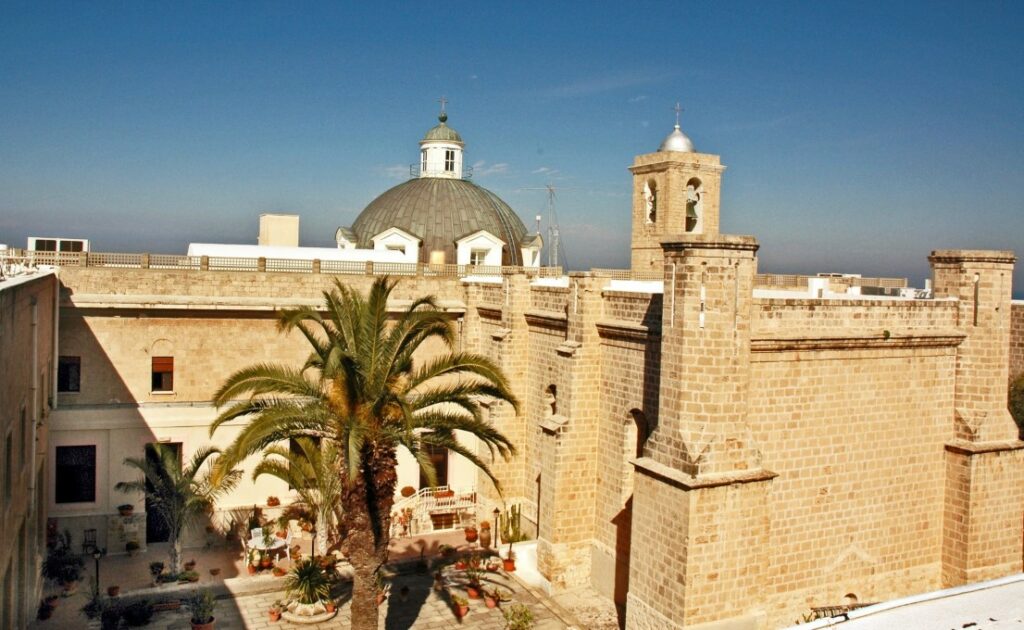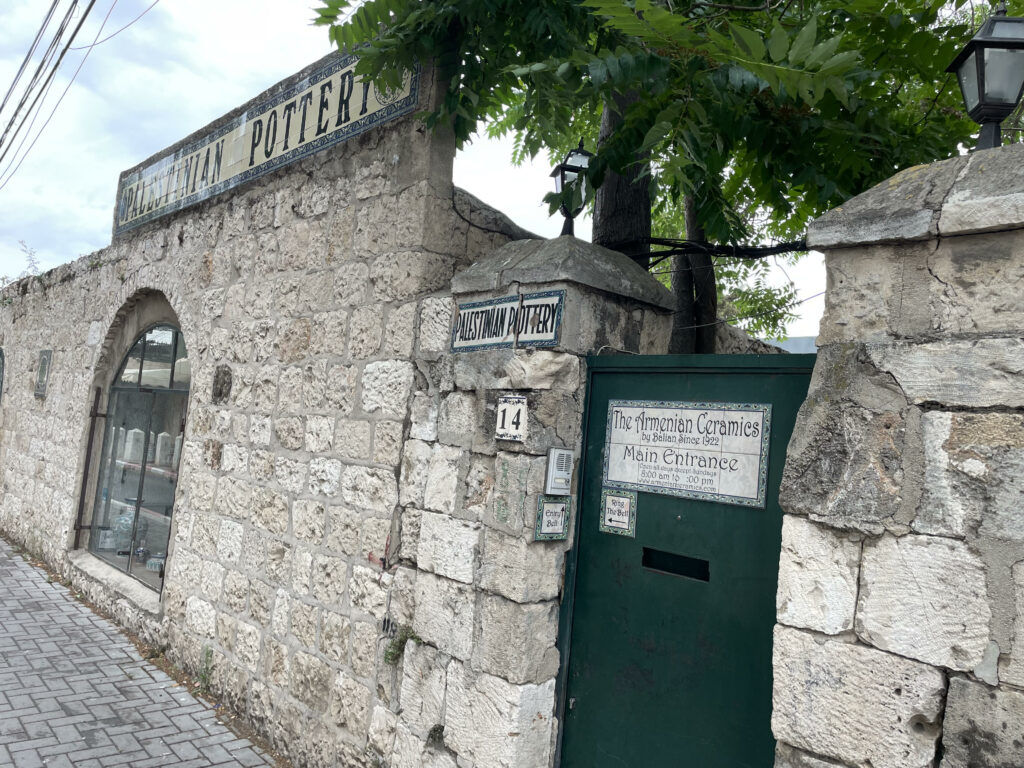
Previous Christians of Haifa refuse any negotiations with aggressors

In 1919, three Armenian families—the Balian, Karakeshian, and Ohanessian families—were brought to Jerusalem by Sir Ronald Henry Amherst Storrs, then military governor of Jerusalem, to renovate the 16th-century tiles at the Dome of the Rock in Al-Aqsa Mosque
The dome’s 16th-century tile work was renovated in the early 1900s by three Armenian families. The artisan tradition of religious respect lives on in Jerusalem to this day. Photo: Albin Hillert/WCC, November
In those days, the artisan families came from the city of Katahia, Turkey. Today, Nishan Balian, the third generation of his family, continues to craft ceramic tiles in Jerusalem, carrying the same name as his grandfather. He took time to reflect on how he sees his work as part of his family’s tradition of building bridges between religions.
“I am proud that Armenian Christians renovated the beautiful tiles that we see even until this day,” said Balian, the artisan behind beautiful ceramic tiles we see not only in Jerusalem but in France and other locations. He recalled the Balian family’s context decades ago.
“People lived together in harmony across religions,” he said. “The story of my family gives a beautiful example that religions can live together and produce beautiful art.”
The art, he believes, transcends the divide between people and between religions. “My family’s connection to the Dome of the Rock renovation is a great honor; we are famous in Jerusalem because of that,” he said. “Today I do ceramic tiles for synagogues; mosques in Qatar and Dubai; and churches throughout the world including in Jerusalem, France, and elsewhere.”
Geometric decorations and tiles in mosques hold a special place in the hearts of many Muslim communities because paintings of human beings are not accepted. As early as the ninth century, tiles were used to decorate mosques, holy shrines, palaces, graves, and religious colleges. Today, decorative tiles are a tradition, and the Dome of the Rock is especially important—it is revered by Muslims as the spot from which the prophet Muhammad ascended to heaven.
The tradition of religious respect—grounded with creativity—that began with Balian’s grandfather lives on. But Balian is concerned about recent divisions and expressions of hatred.
“Unfortunately, things are not what they used to be, and today I see a divide in Jerusalem—but it is a political one,” he said. “I do not characterize the tension as a religious conflict.”
Regardless, he said, the divide is growing, and Jerusalem is not what he used to know 40 years ago. “There is no longer that pluralistic touch that characterized Jerusalem for centuries and made it unique around the world,” he said.
What is the Status Quo? And why the concern?
Below is the background to the historic Status Quo, alluded to by Nishan Balian, as religious relations in Jerusalem are becoming more and more strained.
A statement from the World Council of Churches 11th Assembly echoed Balian’s call for lasting peace and security for all in the Middle East. “Upheavals, violent extremism using religion as justification, ongoing military occupations, discrimination and systematic violations of human rights, economic crises and corruption, absence of the rule of law, and other factors have contributed to an existential crisis for all in the region,” the statement reads, adding that the WCC is committed to the principles of “God’s justice and love for all of creation, the fundamental rights of all people, respect for human dignity, solidarity with the needy and dialogue with people of other faith.”

The divide in Jerusalem is exacerbated by extreme elements in Israeli politics and society that threaten to change the Status Quo in Jerusalem’s Muslim and Christian holy sites. Following the capture of Al-Aqsa Mosque in 1967, then-defense minister Moshe Dayan met with Muslim Awqaf religious leaders on 17 June 1967 and formally returned the mosque to their control. As per the agreement, the Awqaf is to determine who prayed at the site, an arrangement that effectively barred other religions from praying there. Dayan’s intention was to minimize tension and bloodshed and prevent the Arab-Israeli conflict from becoming a holy war. Israel’s commitment was reiterated to Jordan through the 26 October 1994 Wadi Araba peace agreement between the two countries. And on 31 March 2013, Palestinian Authority President Mahmoud Abbas and Jordan’s King Abdullah signed an agreement under which even the Palestinian Authority awarded Jordan recognition of that custodianship. Jordan’s custody began in 1924 when the Supreme Muslim Council of Mandatory Palestine awarded it to the great-grandfather of King Abdullah II.
Israel’s longstanding commitment was violated on 3 January 2023, when for the first time a Minister of the Government of Israel, Itamar Ben Gvir, entered Al Aqsa Mosque, drawing a slew of condemnations from the region and from the wider international community.


تكافح مجلة “ملح الأرض” من أجل الاستمرار في نشر تقارير تعرض أحوال المسيحيين العرب في الأردن وفلسطين ومناطق الجليل، ونحرص على تقديم مواضيع تزوّد قراءنا بمعلومات مفيدة لهم ، بالاعتماد على مصادر موثوقة، كما تركّز معظم اهتمامها على البحث عن التحديات التي تواجه المكون المسيحي في بلادنا، لنبقى كما نحن دائماً صوت مسيحي وطني حر يحترم رجال الدين وكنائسنا ولكن يرفض احتكار الحقيقة ويبحث عنها تماشيًا مع قول السيد المسيح و تعرفون الحق والحق يحرركم
من مبادئنا حرية التعبير للعلمانيين بصورة تكميلية لرأي الإكليروس الذي نحترمه. كما نؤيد بدون خجل الدعوة الكتابية للمساواة في أمور هامة مثل الإرث للمسيحيين وأهمية التوعية وتقديم النصح للمقبلين على الزواج وندعم العمل الاجتماعي ونشطاء المجتمع المدني المسيحيين و نحاول أن نسلط الضوء على قصص النجاح غير ناسيين من هم بحاجة للمساعدة الإنسانية والصحية والنفسية وغيرها.
والسبيل الوحيد للخروج من هذا الوضع هو بالتواصل والنقاش الحر، حول هويّاتنا وحول التغييرات التي نريدها في مجتمعاتنا، من أجل أن نفهم بشكل أفضل القوى التي تؤثّر في مجتمعاتنا،.
تستمر ملح الأرض في تشكيل مساحة افتراضية تُطرح فيها الأفكار بحرّية لتشكل ملاذاً مؤقتاً لنا بينما تبقى المساحات الحقيقية في ساحاتنا وشوارعنا بعيدة المنال.
كل مساهماتكم تُدفع لكتّابنا، وهم شباب وشابات يتحدّون المخاطر ليرووا قصصنا.